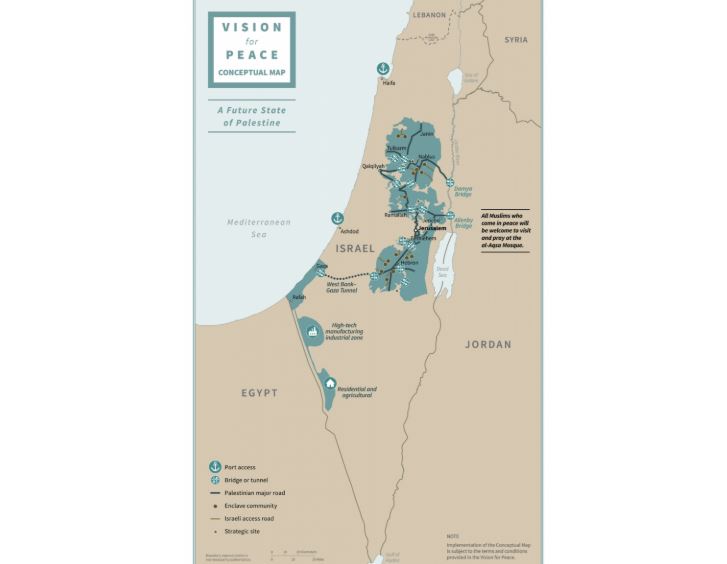Home > Posts > International documents and legal decisions
Trump’s Peace Plan for Palestine Is Really Extermination Plan, Say Brazilian Arabs

By supporting the plan, Brazil has lost its traditional, well-respected position as a neutral mediator, say Brazilian-Arab groups.
By Lise Alves
February 4, 2020
SÃO PAULO, BRAZIL – The announcement by United States’ President, Donald Trump, of a peace plan for the Israeli/Palestine conflict has angered many people, including representatives from three non-governmental organizations linked to the Brazil-Palestine community in Brazil.

Israel-Palestine map under the new peace plan announced by US President Donald Trump, photo internet reproduction.
“This plan has made me quite sad,” says Mohamed Habib, president of ICArabe, (Institute of Arab Culture), and a professor at Unicamp.
The peace plan, dubbed by President Trump himself as the ‘deal of the century’, has been criticized by the representative as being one-sided.
“It cannot be called an agreement. An agreement needs to be made by the two sides. This agreement was made by whom? This was an agreement made about Palestine, without Palestine and without representatives from Palestine,” argues Ahmed Shehada, president of Ibraspal (Brazil-Palestine Institute).
“The implementation of this plan will mean the extermination of the Palestine population. It will not bring peace to the region, it will not bring peace to humanity,” declares Habib.
Ualid Rabah, President of Fepal (Palestine Federation in Brazil), agrees. He says that in many places in the region, Palestinians are already marginalized, considered second-class citizens.
“Israel is planning to create a large ghetto for non-Jews. This is not a peace plan, this is an extermination plan,” Rabah tells The Rio Times.
“I would not call it a peace plan. The plan is offensive and the US and Israeli governments are arrogant calling it a peace plan,” adds Habib.
According to the 79-year-old professor, with Egyptian roots, both Trump and Netanyahu are eyeing the electoral campaigns in their respective countries and are having popularity issues at home. “The two (Trump and Netanyahu) want immediate gains. They want to show themselves as active, as doing something for peace in the region,” he says.
According to Habib this is not a new question. In 1947, he says, the United Nation had a plan for the Palestine territory. The UN deliberation guaranteed rights to non-Jews, but Trump’s plan does not. “Since 1947 the US and Israel have not respected this (UN) deliberation, they never abided by the UN’s decision in favor of Palestine,” he says.
The Fepal representative explains that this new Trump plan is similar to a plan proposed by the United States to then-Palestinian Authority Chairman Yasser Arafat during the Camp David Summit, in 2000. “At the time (US President) Clinton and (Israeli Prime Minister) Barak proposed a plan where Palestine had to give up much of their lands and surrender their Right of Return, in return for a non-contiguous state. Arafat promptly refused,” says Rabah.
“The annulment of the Right of Return for refugees, as now proposed by Trump, means I cannot go back to my town ever again. My parents were thrown out of my town, Yafa (Jaffa). This is absurd. It is ethnic cleansing,” says Shehada who agreed to speak to The Rio Times despite still being at the hospital, recovering from a delicate surgery.
As for the Brazilian government supporting the U.S. President’s plan, the three experts say the country’s position was disappointing. Hours after the ‘peace plan’ announced by President Trump, Brazil’s government issued a note endorsing the project.
“The Brazilian government welcomes the plan of peace and prosperity, presented yesterday by the President of the United States Donald Trump, which sets a promising vision, after more than seven decades of unsuccessful efforts, to resume the path towards the much-desired solution to the Israeli – Palestinian conflict,” read the statement issued by Brazil’s Foreign Service Ministry, Itamaraty.
“The Brazilian government took sides; it stopped being neutral,” says Habib.
Rabah tries to lessen the importance of the support by stating that his entity believes this is only the opinion of a very small group in the Brazilian government. “A radicalized minority in the government,” he says.
Others, however, have harsher words for the current Bolsonaro government and its stance towards Palestine and its people.
“Brazil has always been well respected around the world. Brazil had a tradition (of being neutral). We have now become irrelevant. Brazil has become (like) a domesticated animal, following the powerful (US) around. Brazil must stop being a pet,” says Shehada.
Professor Habib remembers when the country was a respected mediator. “I participated in a few peace-seeking missions and Brazilian officials were always treated as highly-esteemed mediators, willing to listen to both sides.”
For six years, Habib said he worked with officials and students at the Rio Branco Institute, an academy which prepares Brazilian diplomats. “We went there to help those in the foreign service to remain updated as to the situation in the Middle East. We gave lectures and seminars about the geopolitical realities of the area. I was proud to help the foreign service corps.”
Last year, during the first year of Jair Bolsonaro’s presidency, the program was cancelled, says the professor. “The Brazilian government lost its place as an impartial mediator,” he adds.
Brazil’s support of the US/Israeli plan does not even make sense economically, says Fepal’s president. “Brazil registered a surplus with Arab Nations of US$5 billion last year and Brazil only exports one-third of what it could to the region; while with Israel the Brazilian government registered a trade deficit of US$1 billion,” says Rabah.
Rabah, however, is not worried about the future partnerships between Brazil and Arab countries. “Brazil did not start in 2019; we have a strong relationship with Arab nations and they know that one small group does not speak for the entire country,” concludes Rabah.
To show their disagreement with the proposed plan, Rabah says Fepal is coming out this week with a campaign in social media to show that “the deal of the century of is actually the apartheid of the century.”
“The plan will not have the effect they (Trump/Netanyahu) hope. It is a plan that is both unfavorable for Palestinians and for Israelis. No one will have peace,” says Rabah.
“We are fighting against extermination. We want our people to have a right to exist,” states the Fepal president.
“If this cowboy (Trump) insists and continues his aggression, if they (Trump and Netanyahu) try to impose their cowboy and gang logic above the logic of justice, international law and decisions of the international legitimacy, the Palestinians will fight back,” concludes the Ibraspal president.
Source: Lise Alves, The Rio Times

WRITE YOUR COMMENT